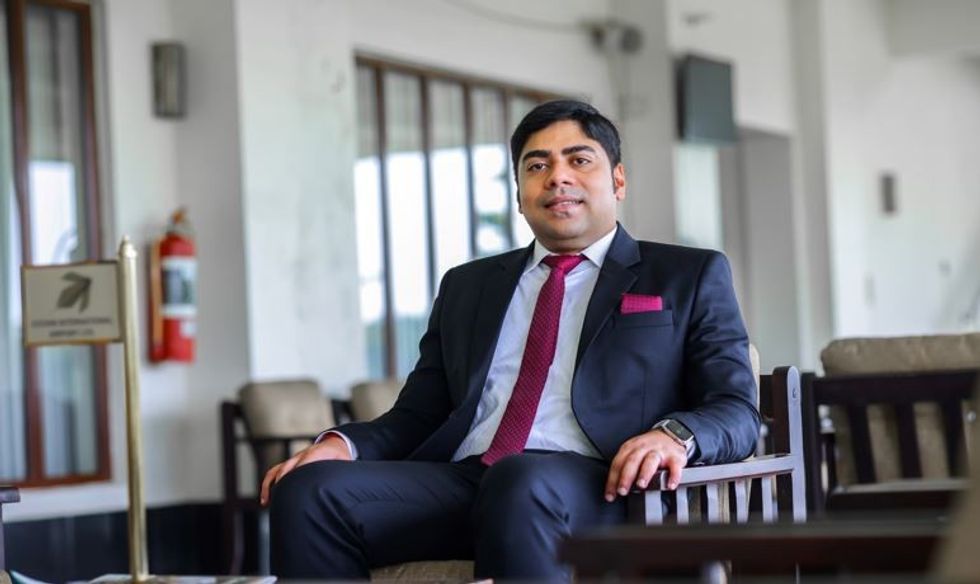THE world’s first airport fully powered by solar energy has boosted its capacity to produce solar power in the past three years and has now also ventured into hydropower, its managing director said.
The Cochin International Airport Limited (CIAL) in Kerala won the Champion of Earth Prize by the UN in 2018 for its green energy initiatives. It is one of the busiest airports in India and handles around 10 million passengers a year.
“We became power neutral in 2015 by the commissioning of our 12.5 MW solar plant installed near cargo terminal. Since then, as new infrastructure is being added, we had to find more space and funds for green energy production,” S Suhas IAS, MD of CIAL told Eastern Eye.
He added, “Now, we have eight plants near the premises of the airport, with a cumulative capacity of 40 MW.
“Another 12.5MW solar plant in Payyanur in northern Kerala will be commissioned in January 2022. Also, we have ventured into hydropower, and the 4.5 MW Arippara power plant was commissioned in November this year.”
“When our green initiative made global headlines, many countries, airports and institutions working in alternative energy systems approached us. Representatives of airport authorities from countries like Liberia and Vietnam and hundreds of technical education institutions from across the globe visited the airport.”

Suhas said the recently concluded COP26 climate conference in Glasgow helped champion the cause of reducing carbon emissions. He said the CIAL solar plants will produce 54 million units of power annually. Over the next 25 years, this green power project will reduce carbon emissions from coal-fired power plants by more than 1.05 million metric tons – the equivalent of planting three million trees, he added.
The airport was one of the flagship projects showcased at the India pavilion at the 2015 Paris climate change conference. India’s prime minister Narendra Modi briefed delegates about CIAL’s green credentials during an address at a round table conference in San Jose, California, in 2015.
Following the CIAL model, India’s Ministry of Civil Aviation instructed all airports in the country to produce at least 1 MW of power from non-conventional sources.
Now, CIAL Infrastructures Limited, a fully owned subsidiary, is looking after energy production.
When asked why the airport explored the solar path, Suhas said CIAL has been “reinventing itself” since it was set up in 1999.
“The idea of running the airport on solar power started with a pilot project in 2013 with the installation of a 100KW solar power plant. The solar panels were placed on the rooftop of terminals. Eventually, in December 2013 we were able to commission a floor-mounted 1MW plant near our hangar. There were two factors in our favour – one was the falling prices of solar panels in the international market and the second was the high electricity cost incurred by the airport,” Suhas said.
“After much deliberation, CIAL took a calculated risk of installing a solar plant which would produce its entire requirement of power from solar energy. The leadership of first managing director, VJ Kurian, also turned out to be decisive. As the state of Kerala was unable to feed its energy demand, the electricity distribution network (grid) was always ready to receive lateral inputs.
“The government also encouraged private companies to produce power and provided them with the framework of the state electricity grid. While cutting down the cost of storing energy, it also ensured that the electrical engineering department can regulate the power output.”
Suhas revealed the airport on average spent around Rs 50m (£500,586) per megawatt of power. The total investment for the latest 12MW plant was approximately Rs 620m (£6.21m).
“Then we could reduce the expenses. Now it costs around Rs 45m (450,528) per MW.”
In January this year, CIAL commissioned one of the biggest, floating solar power plants in the state with a capacity of 452 KWh.
“With this installation, the company introduced cost-effective high-density polyethene floats; using French technology, upon which 1,300 photovoltaic panels were mounted and laid over two artificial lakes located in the 130-acre CIAL golf course.
“The plants, spread over one acre, are connected to the Kerala State Electricity Board (KSEB) power grid, which is to be banked on when needed. Traditionally, the installation of the floating power plant costs two to three times more than that of ground-mounted ones; but with the adoption of French technology – a first in the country – it could bring down the cost on par with that of floor installation,” Suhas said.
“We follow the idea of total sustainability management (TSM) in our golf course, where treated water from the airport sewage treatment plant is used for water harvesting, with the help of 12 artificial lakes. Water from these lakes is used for irrigating the lawns of the golf course. Now, with the installation of the floating power plants, it is another step forward in TSM,” he added.
In recent years, in 2018 and 2019, floods in Kerala severely impacted the airport.
Suhas said, “We devised a comprehensive flood mitigation project. It was called ‘Operation Pravaah’ which addressed the issue of flooding of operational areas and the adjacent villages to a great extent. Phase 1 of Operation Pravaah was completed in July 2021. We spent around Rs 1.2 billion (£12.1m) and were able to avoid flooding of the airport this year. Phase-2 incorporates major construction activities, including the construction of a regulator-cum-bridge (RCB), on the mouth of the Chengal Canal for Rs 204m (£2.04m).
















 Kulsuma Aktergetty images
Kulsuma Aktergetty images
Police may probe anti-Israel comments at Glastonbury